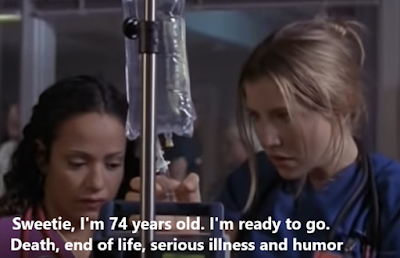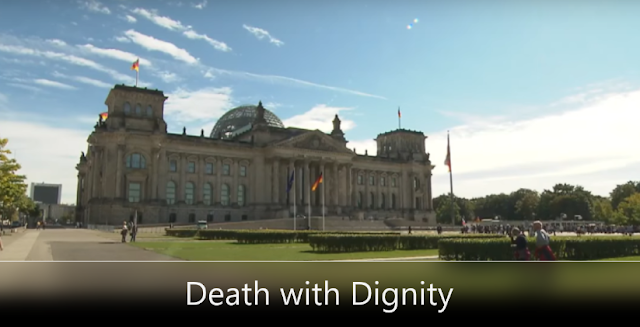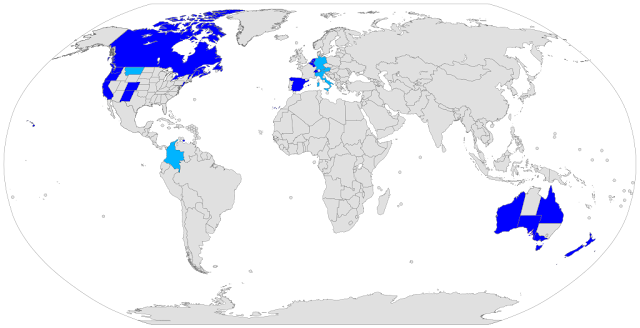Sweetie, I'm 74 years old. I'm ready to go.
And one or two might think - isn't this blog about life, death and grieving, why mentioning and linking to a sitcom series - and my answer is YES - I hear you.
And here comes the 'but' or 'because'. As I firmly believe that we have to take each of the three aspect seriously; I firmly believe or I know that the bandwidth is broad and deep and far away from each other but in the very next moment they are close, very close and even can become congruent.
Death, end of life, serious illness and humor
Curt Goetz, who was a Swiss German writer, actor and film director once said: "Anyone who knew how to die with humor would have reached the highest level of culture" I guess my wife didn't knew this quote. But she lived that way, lived her last weeks, days and hours to her very last second.
We should or have to remember , when we are suffering, our worldview shrinks tremendously. It shrinks into the black hole of suffering and it's hard to see the sun and a feeling of gone lost is often the case. Hope, joy, goodwill, connection with others, meaning in life just get lost. We become less than human - living is turning into existing. Not for everyone, and that is good - but for others and what ever typ of person you are, how ever you deal with such situations in life - respect and understand that others even your partner thinks and believes differently.
And that means a number of people are taken over or their lives are getting overwhelmed by the suffering. What humor allows is the re-connection of one’s suffering with their humanity and brings just a bit of temporary joy back into view. It’s not a panacea, or a game changer but it makes its mark. It’s a 'therapy' that only we humans can share with other humans without needing any technology, pills, or procedures. All that is required is lived experience, a bit of tact, and a sense of humor.
Let me quote my wife's last worda, she said in German: "Ich bin dann mal weg" that means in English "I'm Off Then" - this quote was originally from a book and movie by German comedian and writer Hape Kerkeling written in 2006 and translated into English in 2009 - this book is about a journey and losing and finding oneself on the way of St. James / Camino de Santiago trail.
Imagine and think about what death means to you
Unless we choose, the date, place, manner and time of our death - it will or might remain a mystery. I wonder why so many people won't like to think about it at all? I think the death creates context for my life and for each one's lives. It is unavoidable - the entire life is leading up until that point.
I can not really understand why people maybe don't want to talk about death or think about it. Sure - It might become or might be uncomfortable, sad, and scary. Acknowledging your death means that you are not the center of the story, and that is disquieting to the very fragile human ego. Acknowledging your mortality also means acknowledging our powerlessness and lack of control we have in life. Also uncomfortable. It also means surrendering to the big "I don't knows" of life and also the really big "I don't knows" of "what, if anything, happens after we die?" But since we don't know, why not imagine something absurd, something glorious, something huge? A vision that actually serves you rather than makes you want to recoil in fear. Why not imagine something, as my wife and I have, a small cottage at the Klondike River, where we will meet again and meet all our horses, dogs, cats again.
If I would die today, I know that my death will come as a celebration. As a culmination of a life lived in and loved. A life that's worth dying from. By the way - I want to die sitting in mother nature - either while the sun rises or at sunset. I want to watch the sky change and turn its color - at sunset from orange and pink and purple as day dies into night. I want to hear the wind fluttering through the leaves
After the last decades I spent supporting people, starting with an US soldier in Iraq (who was born in the same year and month as I did) when he an I were only 19 years old and my wife two years ago and other people, as they think through their lives and prepare for their death, I know, I trust that the real gift in being with our mortality is the sheer wonder that we live at all.
Closing this article with the quote I mentioned "Sweetie, I'm 74 years old. I'm ready to go."
Coming back to the quote "Sweetie, I'm 74 years old. I'm ready to go." from the series 'Scrubs' of the fourth episode of Scrubs'first season. One of the doctors tries to convince a 74-year-old patient to start dialysis in order to prolong her life. An other doctor becomes friends with a young patient after they watch a football game together - a young life he could not save. And a third case where the doctor had no chance to save the life of a woman. In the end, all three of the patients die, and the young doctors have their first experience with death - and even it's a comedy, medical drama sitcom series - this episode provides a view into other perspective of living and dying.
A few minutes and a episode with meaningful moments ...
What's wrong with death? What are we so mortally afraid of? Why can't we treat death with a certain amount of humanity and dignity, and decency, and God forbid, and perhaps even humor. If we're going to fight a disease, let's fight one of the most terrible diseases of all, indifference - and fight against it with awareness, empathy and self-awareness.
And perhaps a last quote from a German internist:
"Humor and laughter are the best medicines - unless you have bladder weakness or diarrhea." 😃






If you like to leave a comment - your comments are welcome. Even I will not publish comments, I will read and reply if possible and needed.
ReplyDelete